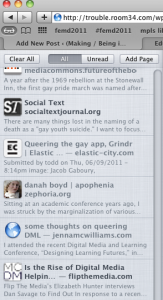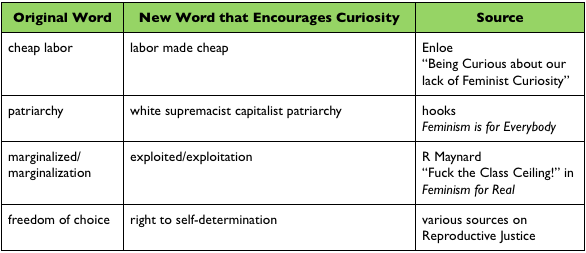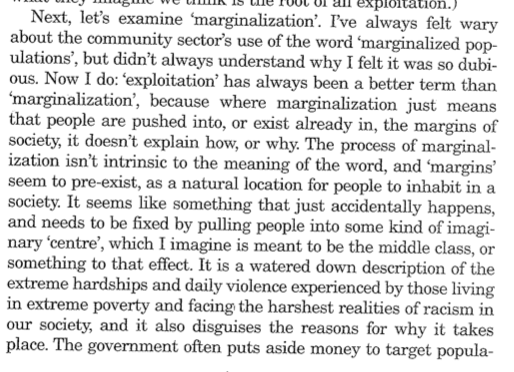I’ve been following Jay Smooth and Ill Doctrine for a couple of years now. His work is amazing…to watch and to teach. I’ve used his video, “How to Tell People They Sound Racist” in at least one of my classes (see here for the lecture). Yesterday morning, while reading my twitter feed (I follow him @jsmooth995), I came across his most recent video, “My Personal Pledge for the ‘Until Abortion Ends’ Movement.” After watching it, I noticed another recent video: “My TEDx Talk, ‘How I Stopped Worrying and Learned to Love Discussing Race‘.” This video, from a talk given last month, is a follow-up to the wildly popular “how to tell people…” video (which is from way back in 2008). Check it out:
This brief speech is packed with great things to talk about. For now, I want to briefly highlight a few key parts of the speech (read the entire transcript at Ill Doctrine):
1. Race is a social construct that was designed not to make sense, but to rationalize and justify indefensible acts:
The first thing is that anytime we’re dealing with race issues, we are dealing with a social construct that was not born out of any science or reason or logic, we are grappling with a social construct that was not designed to make sense. And to the extent that it is the product of design, the race constructs that we live in in America were shaped specifically by a desire to avoid making sense. They were shaped for centuries by a need to rationalize and justify indefensible acts. So when we grapple with race issues, we’re grappling with something that was designed for centuries to make us circumvent our best instincts. It’s a dance partner that’s designed to trip us up. So just based on that alone we should be able to keep in mind that you will never bat a thousand when it comes to dealing with race issues.
2. We need to shift away from the tonsils paradigm of race discourse…
These are things that will just naturally develop in our day-to-day lives, so the problem with that all or nothing binary is it causes us to look at racism and prejudice as if they are akin to having tonsils. Like you either have tonsils, or you don’t, and if you’ve had your prejudice removed, you never need to consider it again. If someone says “I think you may have a little unconscious prejudice,” you say “No–my prejudice was removed in 2005! [Audience laughter] I went to see that movie Crash, it’s all good!”
…and toward the dental hygiene paradigm of race discourse.
But that’s not how these things work; when you go through your day to day lives there are all of these mass media and social stimuli as well as processes that we all have inside our brains that we’re not aware of, that cause us to build up little pockets of prejudice every day, just like plaque develops on our teeth. [Audience laughter] So we need to move away from the tonsils paradigm of race discourse toward the dental hygeine paradigm of race discourse. Basically, if I might just offer one piece of advice.
3. We also need to move away from the idea that being a good person is just what we are and shift toward the recognition that being good is a practice, one that we must work at everyday [note: hmm….see some connections to virtue ethics here; I really like the idea of repeated practices]
And in general I think we need to move away from the premise that being a good person is a fixed, immutable characteristic, and shift towards seeing being good as a practice, and it is a practice that we carry out by engaging with our imperfections. We need to shift from, we need to shift toward thinking of being a good person the same way we think of being a clean person. Being a clean person is something that you maintain and work on every day. We don’t assume that I’m a clean person therefore I don’t need to brush my teeth. And when someone suggests to us that we’ve got something stuck in our teeth, we don’t say “Wh-what do you mean? I have something stuck in my teeth? I’m a clean person! Why would you–” [Audience laughter]
4. Being good does not being perfect, but being willing to engage with our own and each other’s imperfections.
The belief that you must be perfect in order to be good is an obstacle to being as good as you can be. It would make our conversations with each other a lot smoother, and it would make us better at being good, if we could recognize that we’re not perfect and embrace that….So I hope that we can–if I could have one wish it would be that we would reconsider how we conceptualize being a good person, and keep in mind that we are not good despite our imperfections. It is the connection we maintain with our imperfections that allows us to be good. Our connection with our personal and common imperfections, being mindful of those personal and common imperfections is what allows us to be good to each other and be good to ourselves.
5. Having conversations about race isn’t enough to address bigger issues…
So I know that this is no small task, but if we could shift a little bit closer, toward viewing these race conversations the same way we view a conversation about something stuck in our teeth, it would go a long way toward making our conversations a bit smoother and allow us to work together on bigger issues around race.
Because there are a lot of–beyond the persistent conversational awkwardness of race, there are persistent systemic and institutional issues around race that are not caused by conversation, and they can’t be entirely solved by conversation. You can’t talk them away, but we need people to work together and coordinate and communicate to find strategies to work on those systemic issues. Because despite all of the barriers that we’ve broken, all of the apparent markers of progress there are still so many disparities.
…but it is a helpful way to bring us closer so we can work together.
If you look at unemployment rate, infant mortality rate, incarceration rates, median household income, there are so many disparities on the various sides of the color lines in this country that it is worthwhile for us to iron out these conversational issues if for nothing else so that we can get a little closer to working together on those big issues.
So many important themes here–willingness to be wrong/imperfect + emphasis on building connections/community + recognition that being good involves repeated practices–and delivered in a way that encourages us to laugh, think and act. Jay Smooth is awesome.
One other reason (among many) that Jay Smooth is awesome: He’s fostered a great community on his blog; the comments on his Ted Talk post are really impressive (full of love and support). With so much talk about how pointless comments usually are (with trolls and blowhard d-bags derailing or hating on important discussions), it’s always great to see spaces where comments work to build community.






